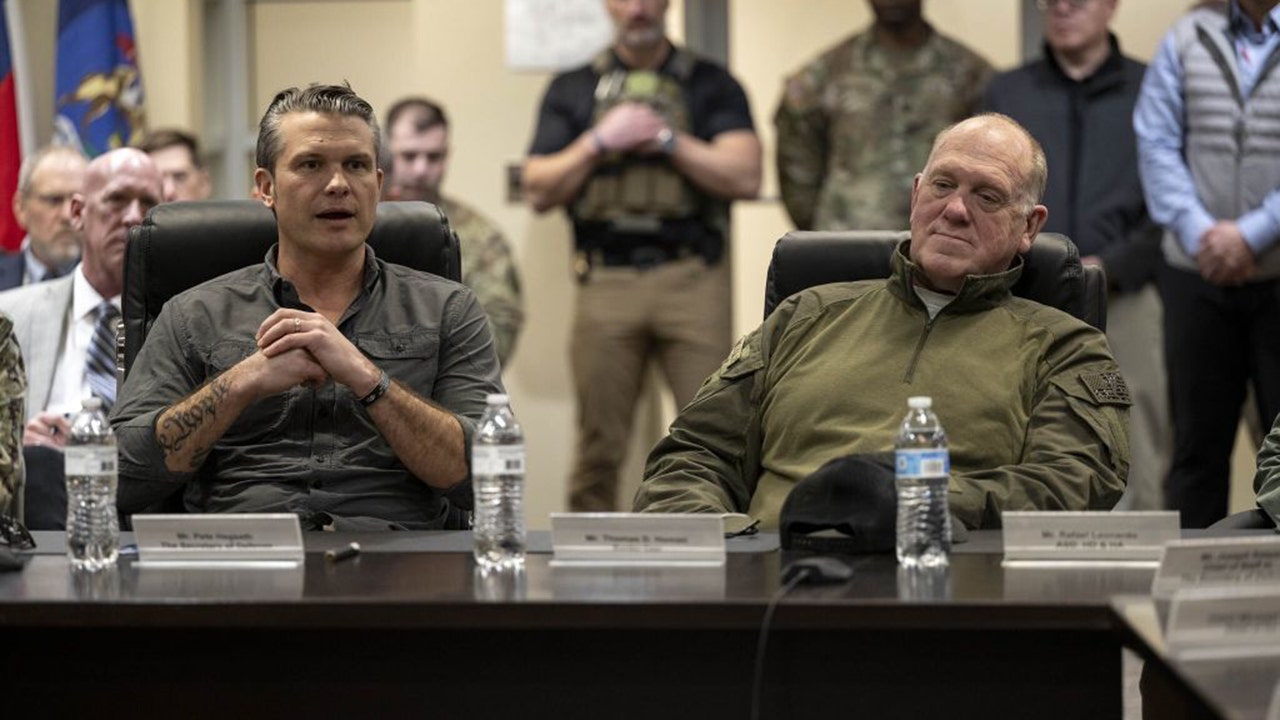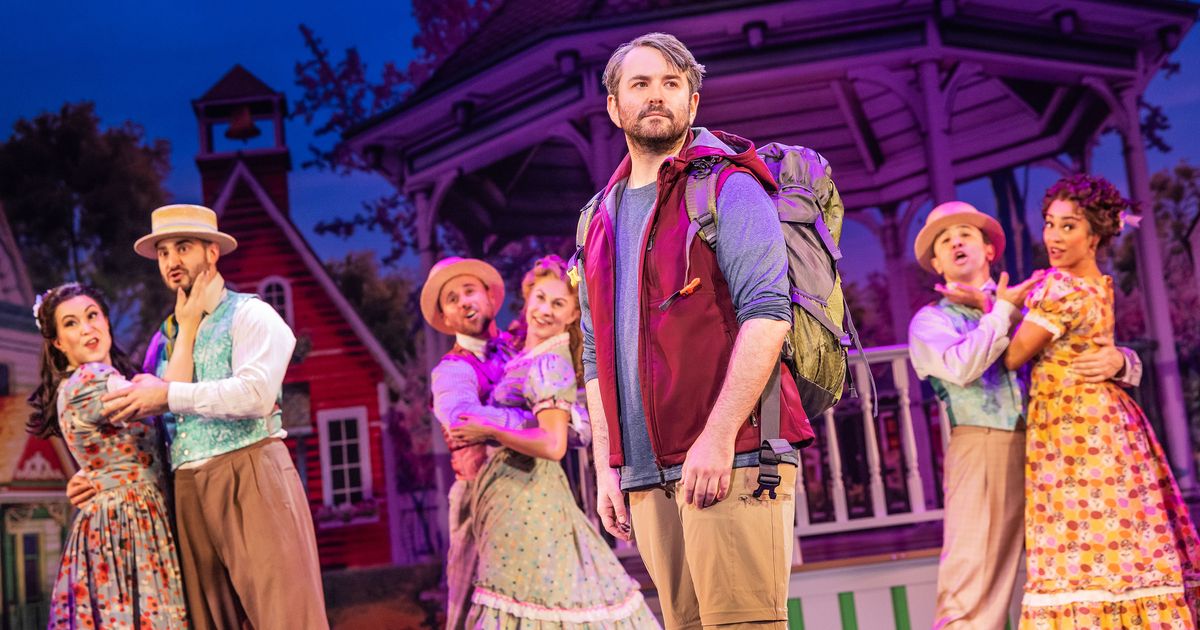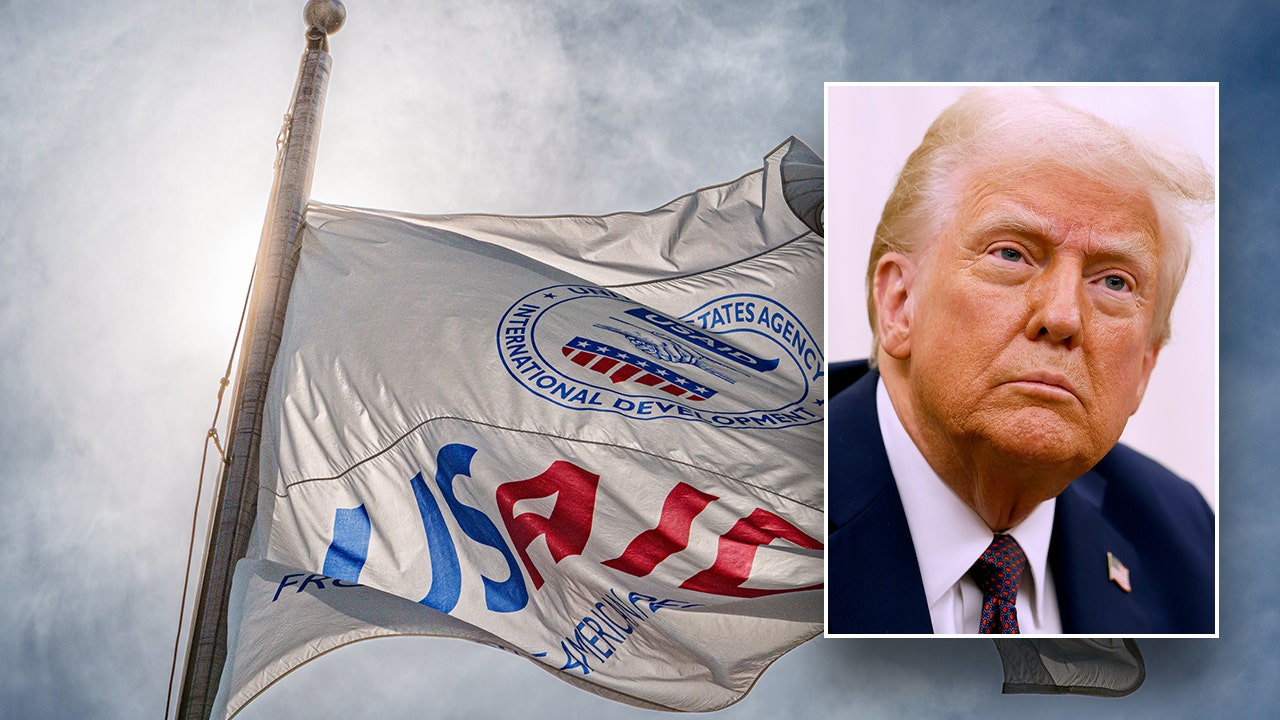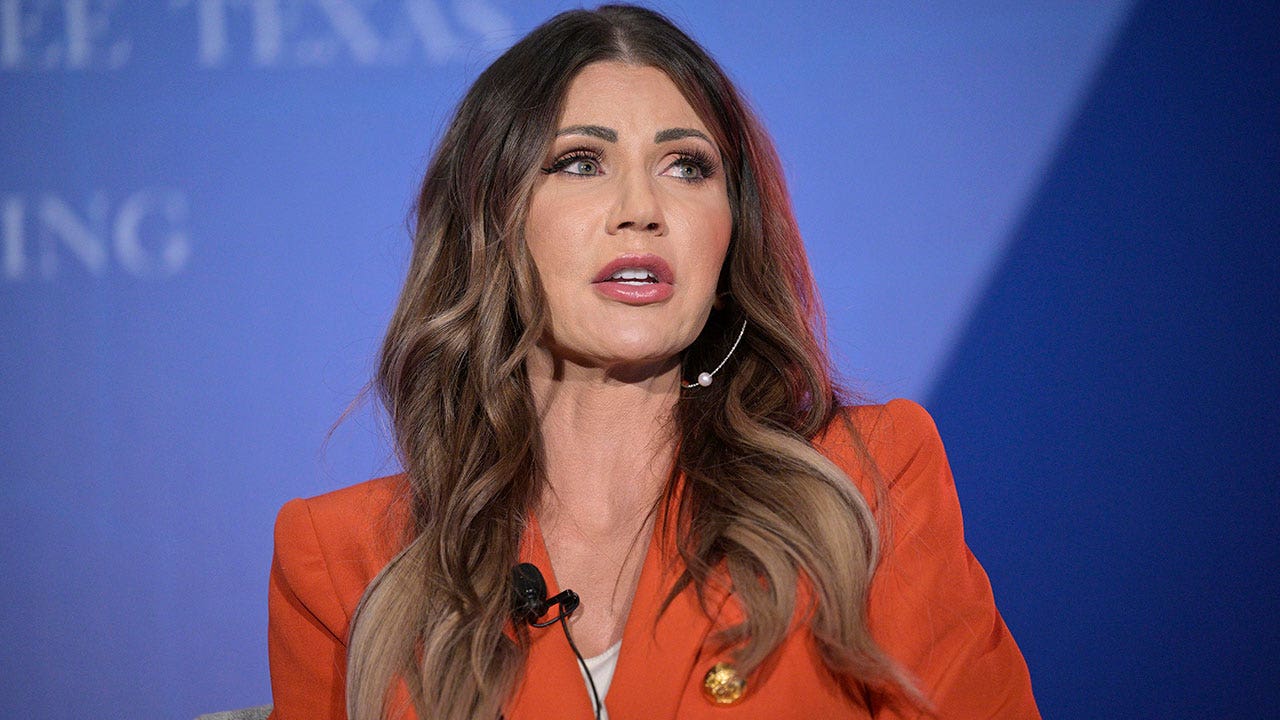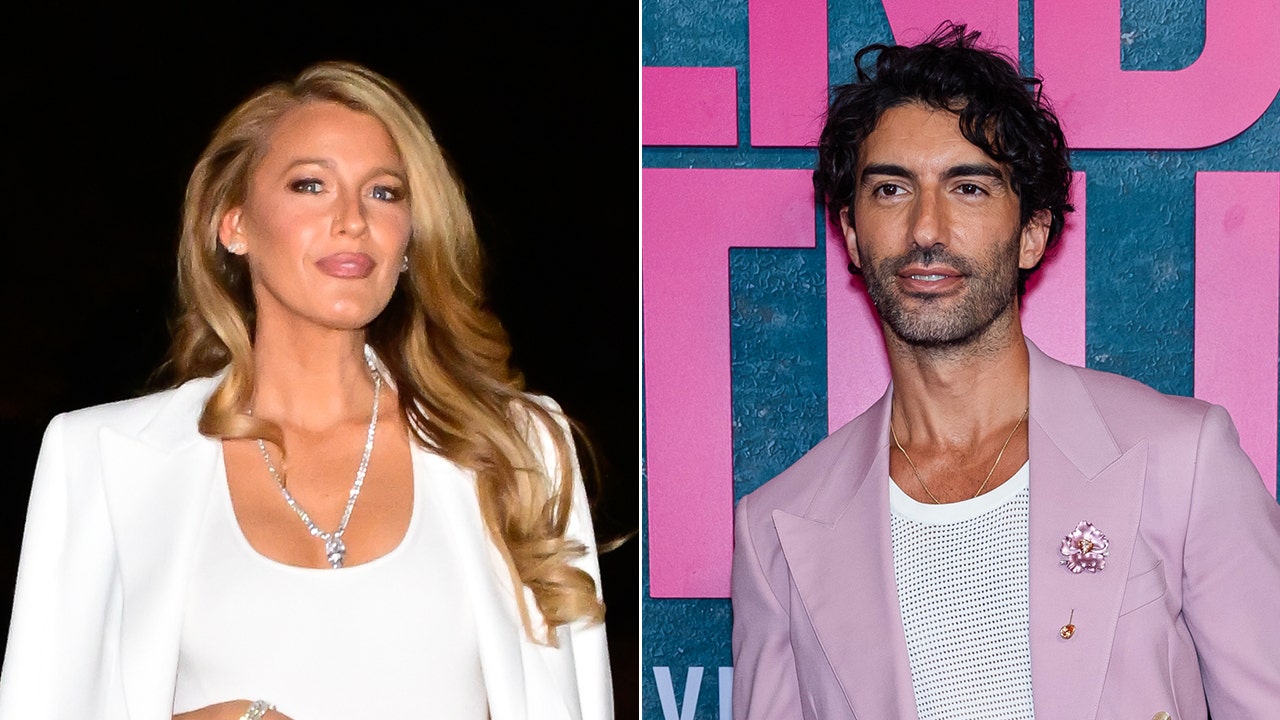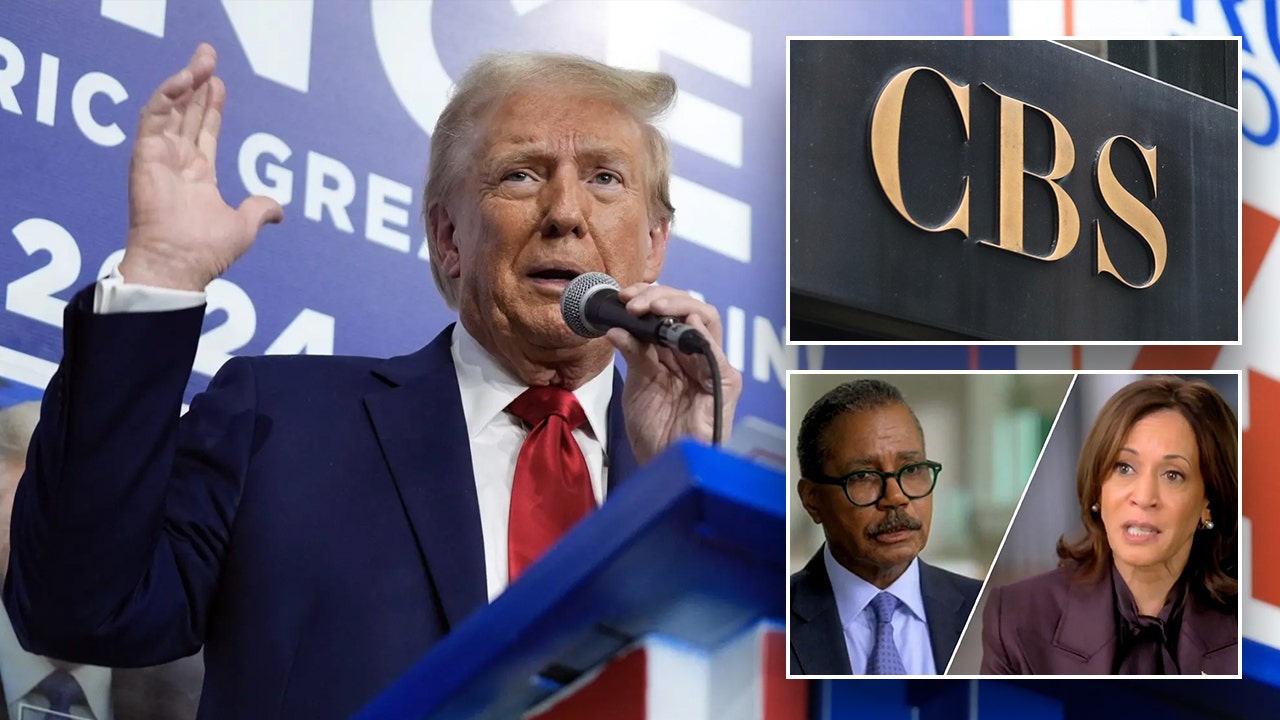From Schmigadoon!, at the Kennedy Center.
Photo: Matthew Murphy and Evan Zimmerman
The mythical town of Brigadoon manifests for one day every century, but Schmigadoon! — that high-fructose fever dream of a town where life is a mashup of (immersive) mid-century musicals — has rematerialized in less than four years. What many, including me, loved about the series was the way it wore its love of classic musicals on its satin cuff, at once reveling in their conventions and gently roasting their outdated sensibilities. It actively, unabashedly solicited your eye rolls.
That Cinco Paul and Ken Daurio’s cockeyed pastiche of Golden Age musicals, first conjured on Apple TV+ during the COVID pandemic, has now sauntered onto the stage feels fated. The first season, after all, riffed on Brigadoon — Lerner and Loewe’s mist-wreathed 1954 musical about two Americans who stumble upon an enchanted 18th-century Scottish village — as well as Oklahoma!, The Music Man, South Pacific, and The King and I. The six-episode series centered on a doctor couple, played by Cecily Strong and Keegan-Michael Key, who find themselves, while on a relationship-repairing backpacking trip, trapped in a town (pop. 167) where nearly everyone speaks from their diaphragm and bursts into song with the reliability of a cuckoo clock. Season two — rebranded as Schmicago — piloted the pastiche toward the brassier, chthonic musicals of the ’60s and ’70s (think Cabaret, Sweeney Todd, Chicago, and Pippin). I was devastated when a third season was canceled, but my spirits lifted when I heard that Schmigadoon! would be reconstructed onstage for an 11-performance run as part of the Kennedy Center’s Broadway Center Stage series.
The sparring couple of the stage adaptation is played by two-time Tony nominee Alex Brightman and Sara Chase. After crossing a stone bridge, they are greeted with a relentlessly chipper welcome number about the sweet-as-a-macaroon air and harvest-moon hearts, full of corn that’s as high as an elephant’s eye. Josh surveys the peppy song-and-dance sequence with the wary expression of a man confronted by a flash mob at a funeral; Melissa, a lifelong musical theater-vore, thinks, initially, wishfully, that they’ve wandered into a Colonial Williamsburg historical reenactment before surrendering to the saccharine spell. It’s a contrast that could tear a couple apart — or at least lead to some intensely awkward picnic-basket auctions. The town’s colors are bright as a spilled bag of Skittles.
From the opening scene, where a Kubrick monolith of a vending machine facilitates Josh and Melissa’s meet-cute, then conveniently flips down like a Murphy bed, director-choreographer Christopher Gattelli moves things along at a brisk pace. The flashbacks that opened each episode of the TV series have been excised, as are some characters. (Doc Lopez’s parents are gone; the gelid Countess Gabrielle Von Blerkom, played by Angel Reda, absorbs some of their lines, and she has a twist ending in her “I Always, Always, Never Get My Man” number.) Fortunately, the songs are never rushed, and a few are new. Cinco Paul’s book, music, and lyrics are a rhapsodic remix of — and tribute to — Broadway classics. You can count the references as you go. Danny Bailey’s “You Done Tamed Me” mirrors the musings of Billy Bigelow in “Soliloquy,” from Carousel. Melissa’s sultry, slightly soused “Enjoy the Ride” echoes “If I Were a Bell,” from Guys and Dolls, and she sings a parody of “Do-Re-Mi” that reworks the solfège from The Sound of Music into a sex-ed lesson. Mildred Layton (Emily Skinner), the town’s self-appointed gatekeeper (“I make sure we all feel shame!” is one of her great lines) and de facto head of the “concerned citizens” group Mothers Against the Future, has a scorcher of a solo in the rapid-fire “Tribulation,” a straight-up channeling of The Music Man’s “Ya Got Trouble.” The lyrics, which career from complaints about “peanut shells in the street” to “hooch-happy sinners” to “billiard parlors and painted ladies,” could have been typeset into a sanctimonious letter to the editor in The Schmigazette. Skinner’s staccato delivery, full of chaotic energy, eats away at the Schmigadoonians with the tenacity of digestive enzymes.
Of the new numbers written expressly for the stage, “I Thought I Was the Only One” stands out. It’s a delicate duet in which Mayor Menlove (Brad Oscar) and Reverend Layton (a milquetoast Kevin del Aguila) bond over their shared affection for rhubarb squares and French éclairs — and make the subtextual all but textual. The biggest musical departure from the TV series is sung by the “known fornicator” Danny Bailey (Ryan Vasquez). It would spoil the show to reveal the title of the song; suffice to say the sweetly swaggering carnival barker finds himself tamed at last — just not in the way you might expect. Even if you don’t catch all the references, the new and old songs, for the most part, work: as delightfully bonkers ballads, as combatively corny excuses to rhyme words like “froggy in formaldehyde” with “enjoy the ride.” In the best of them, you don’t so much listen as become the melodies’ willing accessory.
Yet, for all its savvy reinvention of show tunes, the production’s handling of race strikes a discordant note. The TV series knowingly engaged with the way musicals of the ’40s and ’50s marginalized or caricatured characters of color without giving in to what the historian E.P. Thompson called “the enormous condescension of posterity.” And although it’s still engaged with the subject — the songs “Somewhere Love Is Waiting for You,” “He’s a Queer One, That Man of Mine,” and “I Thought I Was the Only One” sidle up to rather than soft-shoe away from prickly topics — the subtle self-awareness has been diminished for the stage. To state the obvious: Casting a white actor as Josh diminishes the opportunities for the show to probe these problems. Lines from the TV series about “color-blind casting” and “miscegenation” have vanished, as has Mildred Layton’s testy observation that Josh and Melissa make an “exotic couple.” Gone, too, is a scene in which Josh trades confidences with Emma Tate, the Black schoolmarm, about the “menace” Mrs. Layton. When Keegan-Michael Key’s character says to Emma, “So she’s got a problem with you, too … Yeah, that lines up,” there’s a flash in her anthracite eyes, as if he’s picked at a scab she never knew she had; no such tête-à-tête transpires in the Kennedy Center version (which, unlike the show, keeps the schoolroom set sparse, with no Abraham Lincoln portrait). On TV, when Josh presents Carson (Ayaan Diop), the lisping toddler town crier and Emma’s ward, with a kazoo he tells the boy: “When I was in school to be a doctor … there wasn’t anybody like me in my whole group. And to tell the truth, it got pretty lonely sometimes.” In the musical, the sentiment is genericized into: “The other kids made fun of me when I was your age too.”
Brightman’s Josh also comes across as more of a puling partner than his TV predecessor. (Given that all the flashbacks are gone, perhaps the creative team expects the audience to know his backstory already. Judging from the gasps I heard around me during plot twists, at least some members of the audience did not.) With less biographical information for us to go on, Josh’s motivations become more opaque. Are we meant to believe that his “screw’em” attitude is a recapitulation of being bullied as a tot? If so, it’s a doltish simplification. Is his tendency to scorn sentimentality on sight a put-on or a character flaw? This production hasn’t made up its mind; neither can we.
On the bright side, Brightman fully inhabits Josh’s discomfort in a land that he describes as “if The Walking Dead was also Glee.” You see it in his chain-gang shuffle from scene to scene; you hear it in the way his voice becomes fenced with foreboding each time he’s dragooned into being part of the elaborate musical numbers. In his rendezvous with Betsy (a terrific McKenzie Kurtz), the pert and possibly underage waitress who woos him with “Not That Kinda Gal,” it comes through in the way he stretches vowels into diphthongs, as if elongating the sounds could slingshot him out of this nightmare. Chase, meanwhile, strikes the ideal balance between incredulity and giddy immersion as Melissa, whose reverence for musicals lets her navigate Schmigadoon with considerably more flair. It helps that Chase is a more assured singer than Strong was in the role.
Aside from some minor sound issues and flubbed lines on the night I saw the performance, the 21 members of the racially diverse supporting cast are excellent, especially when you factor in the accelerated production schedule. (For Broadway Center Stage productions, the cast rehearses in New York for just two weeks before traveling to D.C. for three days of tech, then a short run.) The bell-voiced Emma Tate (Isabelle McCalla) leads a troupe of precocious schoolkids (played by adults) through a lesson in spelling and perseverance (“With All of Your Heart”) that culminates in some impeccable tap. Ann Harada, the sole returning cast member from the TV show, imbues her role as the mayor’s wife with a priceless cluelessness. The set, designed by Scott Pask, is lit in painterly fashion by Jen Schriever, and its 2-D trees rise into the flies to reveal a painted backdrop featuring a gazebo flanked by a hotel, a church, and a few houses, all benevolently overseen by cherry blossoms.
In a world that often feels more like a Sondheim second act than a sunny Rodgers and Hammerstein opening number, Schmigadoon! offers a heady dose of Golden Age escapism. Maybe too heady at times. As much as I enjoyed many of the songs, at the end of two and half hours, I found myself thinking wistfully of the original Schmigadoon!. Perhaps another incarnation will someday emerge that restores — even adds to — what this one elides. I hope it doesn’t take 100 years.
Schmigadoon! is at the Kennedy Center in Washington, D.C., through February 9.
